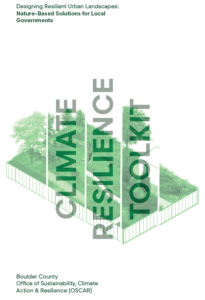Boulder County has collaborated with Superbloom, a Colorado-based landscape architecture firm, and local municipalities to create a toolkit designed to help local governments improve climate resilience and minimize carbon emissions using sustainable, ecosystem-driven methods. The toolkit focuses its research and recommendations on Nature-Based Solutions (NBS) specific to the urban areas of Boulder County.
Designing Resilient Landscapes: Nature Based Solutions for Local Government

Key Takeaways
The toolkit focuses on urban areas in Boulder County, prioritizing benefits to neighborhoods that are the most vulnerable to negative climate impacts. The goal is to improve climate resilience through several strategies, including:
- growing urban shade forests,
- restoring floodplains and streams,
- managing and capturing urban stormwater,
- transforming turf,
- creating cool and living roofs,
- developing urban farms and gardens, and
- managing urban boundaries.
This toolkit represents Boulder County’s first comprehensive effort to maximize green infrastructure across all of the county’s diverse landscapes, which span three different ecological zones: High Prairie (4,800–6,000 ft), Montane Foothills (6,000–8,500 ft), and Alpine (8,500–12,000 ft). Each zone comes with specific needs that influence how these solutions can be used.
A majority of county residents live in areas with elevated climate risks, such as wildland-urban interfaces or areas with elevated flood hazard. The toolkit addresses these unique needs and associated vulnerabilities with targeted strategies. For example, Miyawaki microforests, which grow ten times faster than conventional plantings; xeriscaping techniques that reduce water usage by 60%; and fire-resistant landscaping in new build and reconstruction areas.
About Nature-Based Solutions (NBS)
NBS use natural systems—such as urban forests, green spaces, and waterways—to reduce climate impacts. These systems create benefits that protect, conserve, restore, and sustainably manage ecosystems, while delivering measurable benefits to both people and nature. These approaches help draw down carbon, manage stormwater, and reduce risks like flooding and extreme heat.
Contact Us
Dede Croissant, Project Lead
Office of Sustainability, Climate Action, and Resilience
PO Box 471
Boulder, CO 80306

